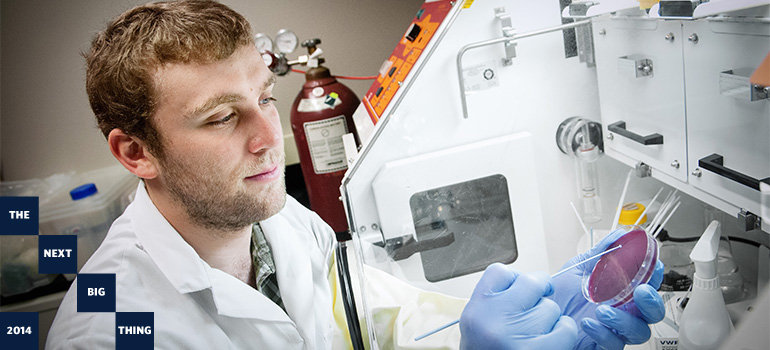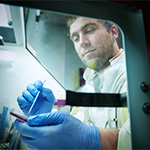“Probiotics are the best intervention we have to foster a healthier gut,” says UBC’s Eric Brown. Photo: Martin Dee
A simple new probiotic intervention may help babies fight off the harmful effects of malnutrition and preserve millions of lives
The future in the fight against global malnutrition may lie in the engineering of a healthy gut.
That’s how Eric Brown, a PhD candidate in microbiology and immunology at the University of British Columbia, sees it.
“Malnutrition can’t be solved with a change in diet alone, or by simply feeding a starving child nutritious food,” says Brown. “Infusing their guts with better strains of bacteria, coupled with a good diet, is what is needed.”
The long and short of the probiotics pitch: In the near future, with the advancements made in genetic technology, newborns in developing countries could soon ingest specific strains of bacteria capable of reversing underlying defects caused by malnutrition. The probiotics, specifically cultured in a lab for the individual child, would help foster a healthy gut, staving off malnutrition and preventing cognitive and gut defects.
It would be time-sensitive, though, with the microbe cocktail needing to be administered to children during the first few years of life when damage done to the gut is irreversible.
New approaches to addressing malnutrition cannot come fast enough as the condition affects millions of people worldwide. Recent figures by the United Nations Food and Agricultural Organization estimate one in eight people of the world’s 7.1 billion population are undernourished. People in areas most affected by malnutrition – sub-Saharan Africa, parts of Southeast Asia and India – die younger, experience stunted growth and become more prone to disease due to a weakened immune system.
The power of microbes
Previous research on gut microbes showed they are implicated in a host of conditions including asthma, diabetes and mental illness among others. Researchers at the University of Washington found that when the gut microbes from severely malnourished children in Malawi were transplanted into mice, the growth stunting carried over to mice even after they were fed a well-nourished diet. A remarkable study involving microbes took place at the University of Guelph, which saw a woman cured of Clostridium difficile, a bacterial infection that causes diarrhea, by inserting probiotic strains from someone else’s feces into her bowel.
“Microbes that live in our guts outnumber human cells by ten times,” says Brown. “They play a profound role in human health that we still do not fully understand.”
Despite the upsurge in research, probiotics aren’t new. In fact, humans have taken these gut microbes for thousands of years in fermented foods and yogurts without knowing it, says Brown. And because access to proper food and sanitation for the entire world is farther off than advances in microbiology, “probiotics are the best intervention we have to foster a healthier gut.”
Probiotics boost a body’s immune system, which allows for your gut to absorb the nutrients in the food we eat. But for a malnourished child, nutrients are hard to absorb. That’s because of environmental enteric dysfunction–or gut dysfunction– a process that takes effect following childbirth in regions with poor sanitation, if a baby does not receive enough probiotics to help stop it. It’s why mothers are encouraged to breastfeed, given the milk they have contains Lactobacillus species– just one of countless bacteria vital to good health.
Much more to learn
So why is all the attention on gut microbes only happening now? The technology simply didn’t exist 10 years ago, says Brown. Researchers can now study the genetic sequences of all the microbes that live in the human gut utilizing a technique called metagenomics. DNA from the microbes is sent to a sequencer that can then identify all the genes and bacteria present.
With the development of new technology and an increase in funding from private organizations like the Bill and Melinda Gates Foundation, the use of probiotics in stopping malnutrition may not be that far off. Currently, Gregor Reid from the University of Western Ontario is teaching African mothers how to make their own probiotics. At UBC’s Michael Smith Laboratories, Brown is working under professor Brett Finlay to develop a model to learn more about the influence intestinal microbes have on malnourishment.
As for how Brown’s vision may come to pass, there’s still a lot to figure out, including its implementation and distribution, not to mention the cost. For instance, the delivery method of the engineered microbes remains unknown, but could come in something as simple as a pill.
“There’s a lot we still don’t know, but we do know probiotics have a beneficial effect on our gut health,” says Brown. “Twenty to 30 years from now, it may become normal for children to take certain probiotics when they’re young.”
Related: Alleviating suffering for millions
UBC Prof. Kishor Wasan’s lab, in conjunction with the Bill and Melinda Gates Foundation, the Canadian Institutes of Health Research (CIHR) and iCoTherapeutics have created a new oral formulation that is in clinical trials to treat leishmaniasis, a disease that afflicts 350 million people worldwide.


